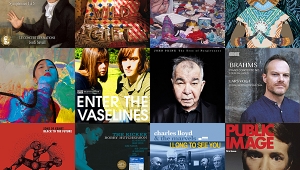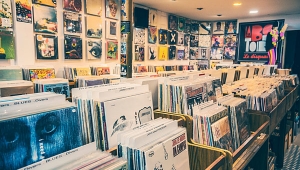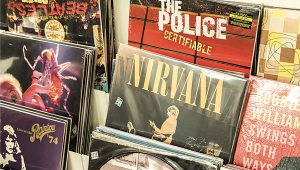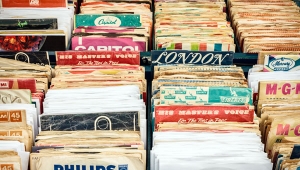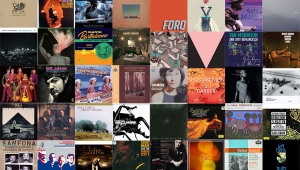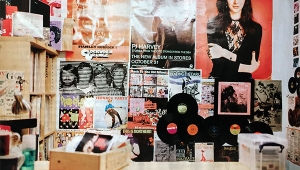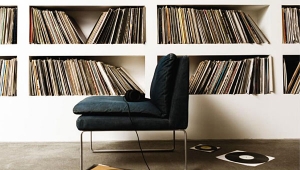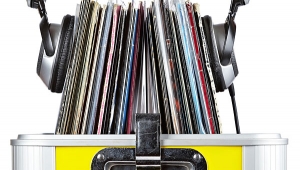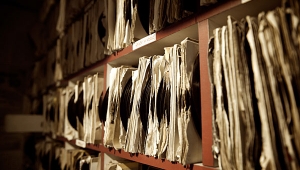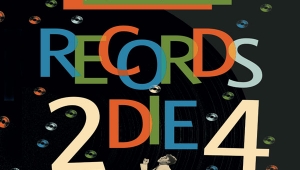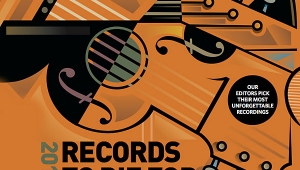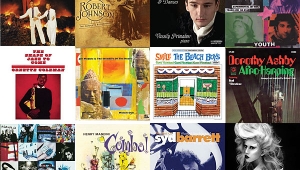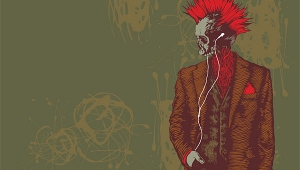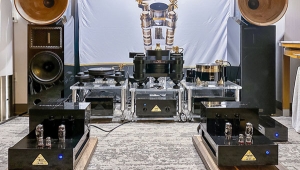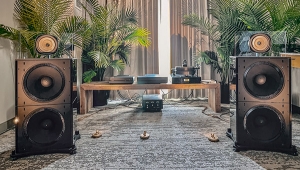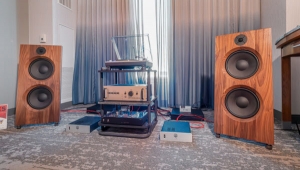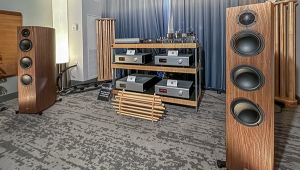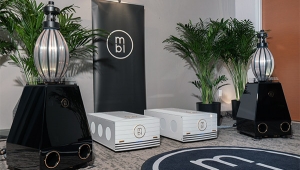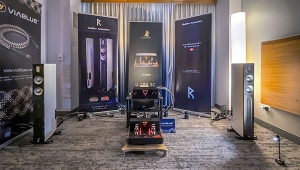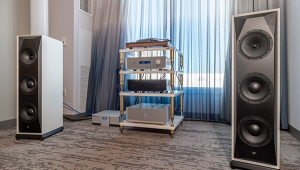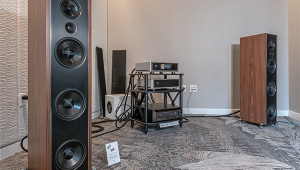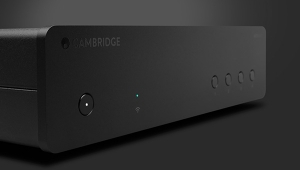| Columns Retired Columns & Blogs |
1998 Records To Die For Page 4
Dan Buckley
PARIS, TEXAS: Original Soundtrack
Music by Ry Cooder
Warner Bros. 25270-2 (CD). 1985. Ry Cooder, prod.; Allen Sides, Mark Ettel, engs. AAD. TT: 34:13
The only soundtrack in my collection to which I return regularly, Ry Cooder's Paris, Texas is a hauntingly exquisite 34 minutes of music. Cooder and partners Jim Dickinson and David Lindley create otherworldly timbres from such traditional instruments as Cooder's trademark slide guitar and Lindley's bowed banjo, generating a sense of emotional water treading that aptly fits the film's troubled mood. Actor Harry Dean Stanton's impassioned vocals on "Canción Mixteca" serve as the sole ray of light in the brooding score. The clarity, richness, and depth of the recording amplify the impact of a musical statement about the essence of the human experience.
WALTER CARLOS: Walter Carlos' Clockwork Orange
Columbia KC 31480 (LP, op). 1972. Rachel Elkind, prod. AAA. TT: 41:37
Though a soundtrack in name, this is not the official one. It's actually all of the music Carlos composed for Stanley Kubrick's landmark film A Clockwork Orange, only a small portion of which was used. Carlos' synthesized arrangements of such classical works as Rossini's La Gazza Ladra and William Tell overtures, the second and fourth movements of Beethoven's Ninth, and Henry Purcell's Music for the Funeral of Queen Mary achieve orchestral dimensions and surprisingly idiomatic style. But it is a 13-minute original entitled Timesteps that most brilliantly captures the film's surreal, out-of-control menace. Twenty-five years after its release, Walter Carlos' Clockwork Orange is still a musical and technical landmark, even more so when one factors in Carlos' ingenious work-arounds of the primitive technology of the day.

Tom Conrad
CHARLES LLOYD: Canto
Charles Lloyd, tenor sax, Tibetan oboe; Bobo Stenson, piano; Anders Jormin, bass; Billy Hart, drums
ECM 1635 (78118-21635-2, CD). 1996/1997. Manfred Eicher, prod.; Jan Erik Kongshaug, eng. DDD. TT: 65:20
Canto is the most daring, the most driven, and the most complete in itself of Charles Lloyd's five ECM recordings. The great ECM engineer Jan Erik Kongshaug renders each telling voice in the quartet with verisimilitude: the rapture of Lloyd's reeds; Bobo Stenson's crystalline piano; the dark power of Anders Jormin's bass; the snare and cymbals of Billy Hart, fragmenting and scattering time. During breaks in the recording of this album in Oslo, Norway in December 1996, Charles Lloyd took walks in the frozen, hushed, silver-white city. In the eye of this music's hurricane, you hear Oslo's austere silence. (XX-7)
THE MODERN JAZZ QUARTET: The Complete Last Concert
Milt Jackson, vibraharp; John Lewis, piano; Percy Heath, bass; Connie Kay, drums
Atlantic Jazz 81976-2 (2 CDs). 1974/1989. Ilhan Mimaroglu, prod.; Dave Hewitt, eng. AAD. TT: 2:28:51
On November 25, 1974, at Avery Fisher Hall in New York, the Modern Jazz Quartet held a Going Out Of Business Sale. Strong men wept when John Lewis chorded for Milt Jackson's hovering vibrato on "Django" for the very last time. If you're going to allow the fact that it was a false alarm to taint your enjoyment of this timeless music—if you're going to get literal about it, and delight in pointing out that the Modern Jazz Quartet in fact stayed together for 20 more years—then you're no friend of mine.

Brian Damkroger
THE BEACH BOYS: Endless Summer
Capitol SVBB-11307 (LP). 1974. Nick Venet, Brian Wilson, prods.; Chuck Britz, eng.; Michael Ross, compilation. AAA. TT: 32:01
Passing over Pet Sounds may cost me my Beach Boys Fan Club Gold Card, but I just can't do without songs like "Wendy," "Fun Fun Fun," and "Don't Worry Baby." I can, however, live without the filler on the original Capitol LPs, so I'll pick this 1974 compilation of hits. The sonics on the LP vary from pretty decent with dimensionality and detail to thin and compressed with no bottom end. The Capitol CD adds "Good Vibrations" and trades dimensionality for improved dynamics and bottom-end punch. The DCC Gold CD, which I've not heard, may be better still. (XVIII-9)
THE DAVE BAILEY SEXTET: One Foot in the Gutter
Dave Bailey, drums; Clark Terry, trumpet; Curtis Fuller, trombone; Junior Cook, tenor sax; Horace Parlan, piano; Peck Morrison, bass
Classic Records BA 17008 (LP). 1995. Mike Berniker, prod.; Frank Laico eng. AAA. TT: 43:36
In the summer of 1960, Dave Bailey collected five of his favorite players and an audience of friends, and spent two days in the studio playing, hanging out, and having a great time. The result is sensational music and a performance of first and only takes that's incredibly tight, yet freewheeling and spontaneous. And the sound—intimacy, balance, dimensionality, detail, perspective—it's just incredible. With the lights out, your listening room will simply melt away, leaving only the players, the studio, and you, bopping and clapping along with the rest of the collected friends.

Robert Deutsch
BRYN TERFEL: Something Wonderful: Bryn Terfel Sings Rodgers & Hammerstein
Bryn Terfel, bass-baritone; Chorus of Opera North, Martin Fitzpatrick, chorus master; English Northern Philharmonic; Paul Daniel, cond.
DG 449 163-2 (CD). 1997. Sid McLauchlan, prod.; Andrew Wedman, Wolf-Dieter Karwatky, engs. DDD. TT: 74:43
Whatever you think of Bryn Terfel's rugby-playing-farm-boy image, this CD of songs by Rodgers & Hammerstein demonstrates that he's not just someone who happens to have a beautiful voice, but a real artist, able to communicate on the emotional as well as on the technical level. He's done his homework so you won't mistake his R&H for Mozart or Handel, and he somehow manages to attain a sincerity and a directness of expression that elude most of his opera-singer colleagues when they essay this sort of material. Listen to "Come Home," an obscure song from Allegro, and see if you don't get a lump in your throat during the floated pianissimo on the final "home." Wonderful songs, great singing, sympathetic arrangements and conducting, and clear, dynamic sound. (XXI-2)
PUCCINI: La Rondine
Angela Gheorghiu, Magda; Roberto Alagna, Ruggero; William Matteuzzi, Prunier; Inva Mula, Lisette; Alberto Rinaldi, Rambaldo; London Symphony, London Voices, Antonio Pappano
EMI 5 56338 2 (2 CDs). 1997. David Groves, prod.; Simon Rhoades, Douglas Blair, engs. DDD. TT: 2:39:00
I have to thank my colleague Bob Levine for this one. Prior to his review of this recording, I had dismissed La Rondine as a failed attempt on Puccini's part to write in the Viennese operetta style. I was...well...wrong. No, La Rondine is not The Merry Widow, nor is it La Bohème or Tosca, but it is a unique work of seductive charm, with some gorgeous tunes. The recording is a gem: perfect casting, Gheorghiu and Alagna having exactly the right kinds of voices for the roles, and there's particularly good work from Mula and Matteuzzi as the secondary couple. Pappano conducts with a flair for drama that makes the piece come alive. Excellent sonics. (XX-9)

PARIS, TEXAS: Original Soundtrack
Music by Ry Cooder
Warner Bros. 25270-2 (CD). 1985. Ry Cooder, prod.; Allen Sides, Mark Ettel, engs. AAD. TT: 34:13
The only soundtrack in my collection to which I return regularly, Ry Cooder's Paris, Texas is a hauntingly exquisite 34 minutes of music. Cooder and partners Jim Dickinson and David Lindley create otherworldly timbres from such traditional instruments as Cooder's trademark slide guitar and Lindley's bowed banjo, generating a sense of emotional water treading that aptly fits the film's troubled mood. Actor Harry Dean Stanton's impassioned vocals on "Canción Mixteca" serve as the sole ray of light in the brooding score. The clarity, richness, and depth of the recording amplify the impact of a musical statement about the essence of the human experience.
WALTER CARLOS: Walter Carlos' Clockwork Orange
Columbia KC 31480 (LP, op). 1972. Rachel Elkind, prod. AAA. TT: 41:37
Though a soundtrack in name, this is not the official one. It's actually all of the music Carlos composed for Stanley Kubrick's landmark film A Clockwork Orange, only a small portion of which was used. Carlos' synthesized arrangements of such classical works as Rossini's La Gazza Ladra and William Tell overtures, the second and fourth movements of Beethoven's Ninth, and Henry Purcell's Music for the Funeral of Queen Mary achieve orchestral dimensions and surprisingly idiomatic style. But it is a 13-minute original entitled Timesteps that most brilliantly captures the film's surreal, out-of-control menace. Twenty-five years after its release, Walter Carlos' Clockwork Orange is still a musical and technical landmark, even more so when one factors in Carlos' ingenious work-arounds of the primitive technology of the day.
Tom Conrad
CHARLES LLOYD: Canto
Charles Lloyd, tenor sax, Tibetan oboe; Bobo Stenson, piano; Anders Jormin, bass; Billy Hart, drums
ECM 1635 (78118-21635-2, CD). 1996/1997. Manfred Eicher, prod.; Jan Erik Kongshaug, eng. DDD. TT: 65:20
Canto is the most daring, the most driven, and the most complete in itself of Charles Lloyd's five ECM recordings. The great ECM engineer Jan Erik Kongshaug renders each telling voice in the quartet with verisimilitude: the rapture of Lloyd's reeds; Bobo Stenson's crystalline piano; the dark power of Anders Jormin's bass; the snare and cymbals of Billy Hart, fragmenting and scattering time. During breaks in the recording of this album in Oslo, Norway in December 1996, Charles Lloyd took walks in the frozen, hushed, silver-white city. In the eye of this music's hurricane, you hear Oslo's austere silence. (XX-7)
THE MODERN JAZZ QUARTET: The Complete Last Concert
Milt Jackson, vibraharp; John Lewis, piano; Percy Heath, bass; Connie Kay, drums
Atlantic Jazz 81976-2 (2 CDs). 1974/1989. Ilhan Mimaroglu, prod.; Dave Hewitt, eng. AAD. TT: 2:28:51
On November 25, 1974, at Avery Fisher Hall in New York, the Modern Jazz Quartet held a Going Out Of Business Sale. Strong men wept when John Lewis chorded for Milt Jackson's hovering vibrato on "Django" for the very last time. If you're going to allow the fact that it was a false alarm to taint your enjoyment of this timeless music—if you're going to get literal about it, and delight in pointing out that the Modern Jazz Quartet in fact stayed together for 20 more years—then you're no friend of mine.
Brian Damkroger
THE BEACH BOYS: Endless Summer
Capitol SVBB-11307 (LP). 1974. Nick Venet, Brian Wilson, prods.; Chuck Britz, eng.; Michael Ross, compilation. AAA. TT: 32:01
Passing over Pet Sounds may cost me my Beach Boys Fan Club Gold Card, but I just can't do without songs like "Wendy," "Fun Fun Fun," and "Don't Worry Baby." I can, however, live without the filler on the original Capitol LPs, so I'll pick this 1974 compilation of hits. The sonics on the LP vary from pretty decent with dimensionality and detail to thin and compressed with no bottom end. The Capitol CD adds "Good Vibrations" and trades dimensionality for improved dynamics and bottom-end punch. The DCC Gold CD, which I've not heard, may be better still. (XVIII-9)
THE DAVE BAILEY SEXTET: One Foot in the Gutter
Dave Bailey, drums; Clark Terry, trumpet; Curtis Fuller, trombone; Junior Cook, tenor sax; Horace Parlan, piano; Peck Morrison, bass
Classic Records BA 17008 (LP). 1995. Mike Berniker, prod.; Frank Laico eng. AAA. TT: 43:36
In the summer of 1960, Dave Bailey collected five of his favorite players and an audience of friends, and spent two days in the studio playing, hanging out, and having a great time. The result is sensational music and a performance of first and only takes that's incredibly tight, yet freewheeling and spontaneous. And the sound—intimacy, balance, dimensionality, detail, perspective—it's just incredible. With the lights out, your listening room will simply melt away, leaving only the players, the studio, and you, bopping and clapping along with the rest of the collected friends.
Robert Deutsch
BRYN TERFEL: Something Wonderful: Bryn Terfel Sings Rodgers & Hammerstein
Bryn Terfel, bass-baritone; Chorus of Opera North, Martin Fitzpatrick, chorus master; English Northern Philharmonic; Paul Daniel, cond.
DG 449 163-2 (CD). 1997. Sid McLauchlan, prod.; Andrew Wedman, Wolf-Dieter Karwatky, engs. DDD. TT: 74:43
Whatever you think of Bryn Terfel's rugby-playing-farm-boy image, this CD of songs by Rodgers & Hammerstein demonstrates that he's not just someone who happens to have a beautiful voice, but a real artist, able to communicate on the emotional as well as on the technical level. He's done his homework so you won't mistake his R&H for Mozart or Handel, and he somehow manages to attain a sincerity and a directness of expression that elude most of his opera-singer colleagues when they essay this sort of material. Listen to "Come Home," an obscure song from Allegro, and see if you don't get a lump in your throat during the floated pianissimo on the final "home." Wonderful songs, great singing, sympathetic arrangements and conducting, and clear, dynamic sound. (XXI-2)
PUCCINI: La Rondine
Angela Gheorghiu, Magda; Roberto Alagna, Ruggero; William Matteuzzi, Prunier; Inva Mula, Lisette; Alberto Rinaldi, Rambaldo; London Symphony, London Voices, Antonio Pappano
EMI 5 56338 2 (2 CDs). 1997. David Groves, prod.; Simon Rhoades, Douglas Blair, engs. DDD. TT: 2:39:00
I have to thank my colleague Bob Levine for this one. Prior to his review of this recording, I had dismissed La Rondine as a failed attempt on Puccini's part to write in the Viennese operetta style. I was...well...wrong. No, La Rondine is not The Merry Widow, nor is it La Bohème or Tosca, but it is a unique work of seductive charm, with some gorgeous tunes. The recording is a gem: perfect casting, Gheorghiu and Alagna having exactly the right kinds of voices for the roles, and there's particularly good work from Mula and Matteuzzi as the secondary couple. Pappano conducts with a flair for drama that makes the piece come alive. Excellent sonics. (XX-9)
- Log in or register to post comments

